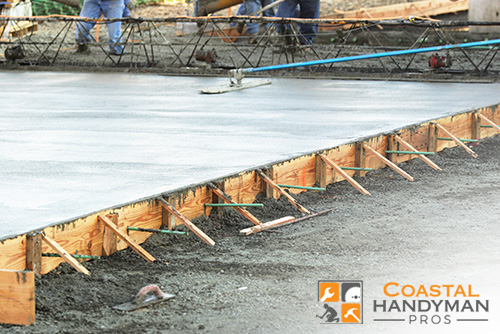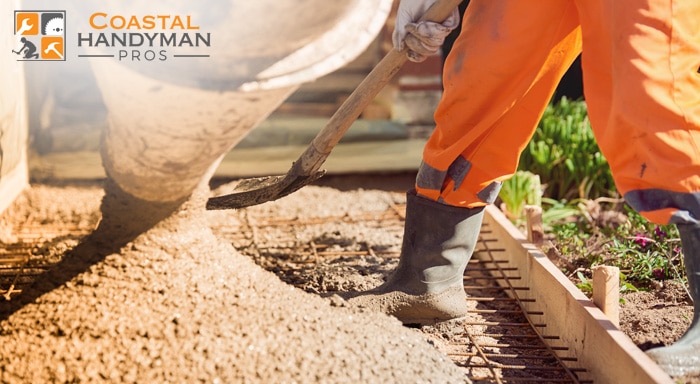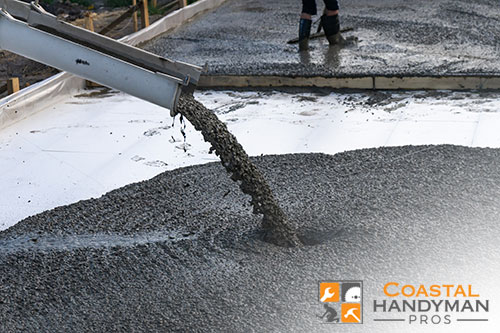If you’re a property owner, you know the importance of maintenance. Maintenance of your properties, whether they are commercial properties or homes, can be a real source of stress for many. The financial strain, time consumption, and level of attention required to keep your property safe and inhabitable can be huge. However, maintenance does not have to be a total nightmare. There are many factors to consider when it comes to repairing, refurbishment, or even building a property from scratch. Consider concrete ada ramp installation for handicap for example.
Call: (949) 415-4534 to get started
What Are The Foundations Of A Building?
It sounds self-explanatory, but the foundations of a building are more than meets the eye. The foundations are arguably the most important part of a building, keeping it safe from further damage, as well as ensuring it is stable and strong enough to be lived in safely.
Why Are Concrete Foundations So Important?

Foundations are so important because:
- They prevent the building from falling down. The reason buildings can withstand storms, earthquakes, and of course, time, is because its foundations are strong. When foundations are built, the construction workers dig into the ground where your property will be built, providing a root for the building. The structure is then filled in and provides a safe, stable platform for the rest of the property to be built upon. Think of a property like a pyramid; without the flat, strong, stable bottom layer, the rest of the pyramid would topple and fall.
- Preventing moisture damage. Foundations aren’t just there to keep the building upright. Well-built foundations of a house or commercial property will keep the building strong by preventing moisture from seeping into the structure from the ground. The ground the property is built on is, of course, full of water, and this can severely damage a building and make it unsafe to inhabit. Foundations provide a barrier between this moisture and the rest of the building.
- “Dead loads” and “live loads”. These are terms used by structural concrete contractors to mean the different types of weight which are applied to the foundations of a building. The “dead load” refers to the weight of the building which never changes: the actual construction of the building itself. The “live loads” refer to the changing weights and varying types of pressure applied by changes in the building. This includes furniture being moved in and out, and the ever-changing number of people who move in and out of the building.
What Happens When Foundations Fail?
When commercial concrete foundations of a warehouse or home fail, it can be disastrous. In the event of natural disasters like earthquakes or floods, if the foundations of a building crack or split, the whole building can come down. This, of course, can be absolutely devastating for those who remain inside, causing serious injury and sometimes death.
In less dire circumstances, however, damage to a building’s foundation doesn’t always mean the end of the building itself. Damage to foundations such as water damage or cracking can be fixed by a structural concrete foundation contractor.
Likewise, if you have a property that needs updating, like an empty warehouse, barn, or derelict garage, concrete footings must be built and installed there, for you to be able to build upon that space. Otherwise, you will be building an unsafe, and often illegal, structure.
When Do I Need To Call A Structural Concrete Contractor?
There are multiple scenarios in which to call a contractor.
- If you suspect there is any damage to the structure of your property, call a contractor straight away. The building could be unsafe to inhabit.
- If you have a property which is perfectly safe but you are considering an extension, a refurbishment or a total pull-down of the property, a structural concrete contractor is your first port of call.
Warehouse concrete foundation installation. If your company is expanding and you are building a warehouse or other commercial property from scratch. - Buying an old or derelict building. If you have purchased a derelict site in order to build upon it yourself, checking in with a structural concrete contractor will help you assess the work that needs to be done.
- Storefront remodeling. If you own a store that is open to the public and in full view, and you want to improve its look or change it altogether.
How Are Concrete Foundations Repaired?
In order to repair a damaged foundation, an experienced, reliable contractor must be involved. The importance of foundations for safety and legality means that doing this yourself without experience is not an option.
Once the experienced structural concrete foundation contractor has accepted the job, there are a few steps to having your concrete foundations repaired.
- Assessment. The contractor will visit your property and assess the damage that has occurred. There might be a clear source of damage if there has been a direct impact on the property such as an earthquake. However, most often, the source of damage is unclear until it is assessed by a professional.
- Organizing the repair. Depending on the level of damage to your concrete foundations, the contractor will advise you on the next steps you must take. The repair might require specialist equipment if it is severe; on the other hand, the solution might be simpler than you originally thought. Whatever the course of action, the structural concrete contractor will assist you and implement the next steps alongside you.
- The repair itself. Once this is all organized, the building can be repaired. During this time, if there is any danger of building collapse or other further damage, residents or workers may be asked to vacate the property. The repair will be implemented as quickly as possible but can take time, depending on the severity of the job.


